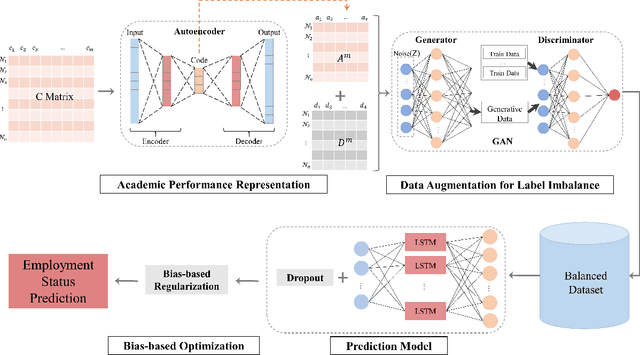Xiaomei Bai
EAGLE: Contrastive Learning for Efficient Graph Anomaly Detection
May 12, 2025



Abstract:Graph anomaly detection is a popular and vital task in various real-world scenarios, which has been studied for several decades. Recently, many studies extending deep learning-based methods have shown preferable performance on graph anomaly detection. However, existing methods are lack of efficiency that is definitely necessary for embedded devices. Towards this end, we propose an Efficient Anomaly detection model on heterogeneous Graphs via contrastive LEarning (EAGLE) by contrasting abnormal nodes with normal ones in terms of their distances to the local context. The proposed method first samples instance pairs on meta path-level for contrastive learning. Then, a graph autoencoder-based model is applied to learn informative node embeddings in an unsupervised way, which will be further combined with the discriminator to predict the anomaly scores of nodes. Experimental results show that EAGLE outperforms the state-of-the-art methods on three heterogeneous network datasets.
Multiple Instance Learning for Cheating Detection and Localization in Online Examinations
Feb 09, 2024Abstract:The spread of the Coronavirus disease-2019 epidemic has caused many courses and exams to be conducted online. The cheating behavior detection model in examination invigilation systems plays a pivotal role in guaranteeing the equality of long-distance examinations. However, cheating behavior is rare, and most researchers do not comprehensively take into account features such as head posture, gaze angle, body posture, and background information in the task of cheating behavior detection. In this paper, we develop and present CHEESE, a CHEating detection framework via multiplE inStancE learning. The framework consists of a label generator that implements weak supervision and a feature encoder to learn discriminative features. In addition, the framework combines body posture and background features extracted by 3D convolution with eye gaze, head posture and facial features captured by OpenFace 2.0. These features are fed into the spatio-temporal graph module by stitching to analyze the spatio-temporal changes in video clips to detect the cheating behaviors. Our experiments on three datasets, UCF-Crime, ShanghaiTech and Online Exam Proctoring (OEP), prove the effectiveness of our method as compared to the state-of-the-art approaches, and obtain the frame-level AUC score of 87.58% on the OEP dataset.
* 12 pages, 7 figures
Graduate Employment Prediction with Bias
Dec 27, 2019



Abstract:The failure of landing a job for college students could cause serious social consequences such as drunkenness and suicide. In addition to academic performance, unconscious biases can become one key obstacle for hunting jobs for graduating students. Thus, it is necessary to understand these unconscious biases so that we can help these students at an early stage with more personalized intervention. In this paper, we develop a framework, i.e., MAYA (Multi-mAjor emploYment stAtus) to predict students' employment status while considering biases. The framework consists of four major components. Firstly, we solve the heterogeneity of student courses by embedding academic performance into a unified space. Then, we apply a generative adversarial network (GAN) to overcome the class imbalance problem. Thirdly, we adopt Long Short-Term Memory (LSTM) with a novel dropout mechanism to comprehensively capture sequential information among semesters. Finally, we design a bias-based regularization to capture the job market biases. We conduct extensive experiments on a large-scale educational dataset and the results demonstrate the effectiveness of our prediction framework.
 Add to Chrome
Add to Chrome Add to Firefox
Add to Firefox Add to Edge
Add to Edge